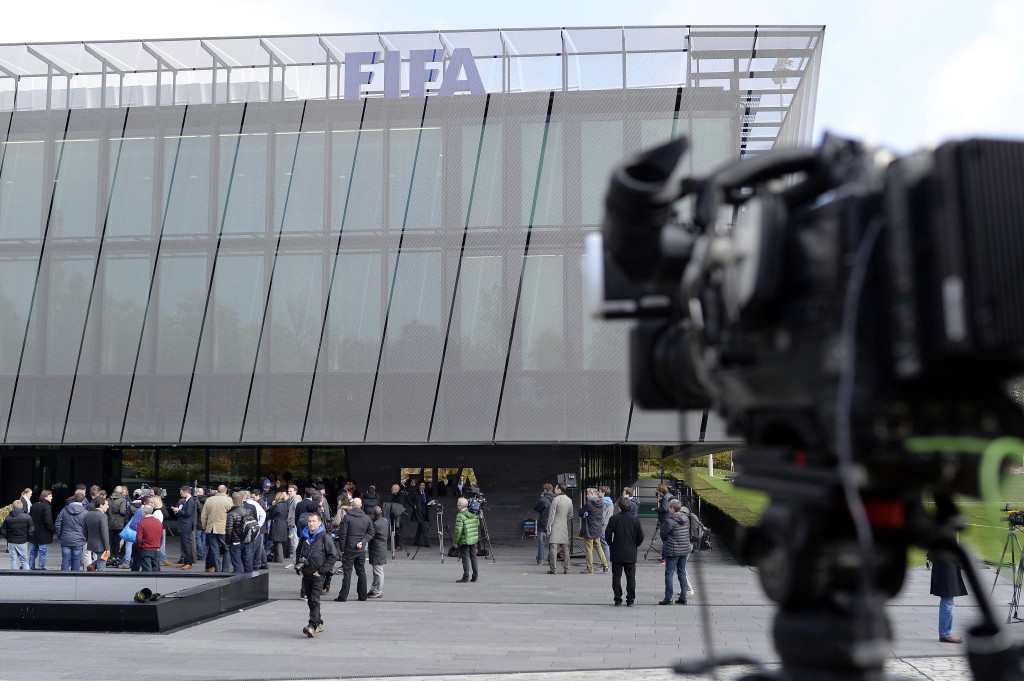
Media representatives wait outside of the FIFA headquarters in Zurich, Switzerland as board members arrive at the FIFA headquarters in Zurich, Switzerland, Tuesday Oct. 20, 2015. (Walter Bieri/Keystone via AP)
ZURICH — Sticking with plans for a presidential election in February and revealing a series of reforms, FIFA sought to move the scandal-tarnished governing body into a new era on Tuesday (Wednesday Manila time).
But the shadow of corruption will return when ethics investigators reveal the identity of senior officials facing sanctions.
The new freedom to lift the veil of secrecy on cases will be exercised — once the accused have been notified — after FIFA’s executive committee approved a request by its ethics court.
Sitting on FIFA’s soon-to-be-overhauled ruling body as a senior vice president is Angel Maria Villar, who is under investigation in the corruption probe into the bidding contests for the 2018 and 2022 World Cups but has never been publicly named by the executive body.
The Spanish federation head is de facto acting UEFA president following Michel Platini’s provisional suspension two weeks ago over a 2011 payment from FIFA. Villar replaced Platini as the acting chairman of the 2018 World Cup organizing committee.
German great Franz Beckenbauer, who was a FIFA voter when Russia was chosen to host the 2018 World Cup and Qatar secured the 2022 tournament, is also under scrutiny.
Beckenbauer was provisionally suspended last year for initially refusing to assist the bidding investigation by Michael Garcia, then FIFA’s prosecutor. Separately, World Cup-winning player and coach Beckenbauer denied on Sunday paying anyone to secure votes for Germany’s 2006 bid following allegations that bribes were involved.
In the official 2018-2022 investigation, FIFA announced last year that “a number of formal cases” had been opened against unidentified individuals.
“In future, it will be possible to confirm the opening of proceedings against leading representatives of world football on request,” FIFA ethics committee said Tuesday.
The committee’s decision two weeks ago to suspend Platini has created uncertainty around the election to select Sepp Blatter’s successor. The FIFA president is also provisionally banned for 90 days over a 2011 payment of 2 million Swiss francs ($2 million) to Platini.
Acting FIFA president Issa Hayatou led an executive committee meeting for the first time. It decided the Feb. 26 election should proceed as planned.
With no clear timetable for Platini to challenge his provisional suspension, officials who have supported the UEFA leader’s presidential campaign — such as Sheikh Salman Bin Ebrahim Al Khalifa — must now decide whether to also apply by Monday’s deadline.
Platini submitted his candidacy ahead of the Oct. 26 deadline but faces being kept out over the 2011 payment from FIFA for work he says was carried out at least nine years earlier.
Platini has challenged his suspension, pending a full ethics investigation, and is awaiting the verdict of the FIFA appeals committee. UEFA is pushing for a swift decision in appeals at FIFA and possibly the Court of Arbitration for Sport.
FIFA said its election oversight committee will not rule on Platini’s eligibility as a candidate — including a mandatory integrity check — until “such a ban be lifted or expire before the FIFA presidential election.”
Sheikh Salman, the Asian Football Confederation president from Bahrain, should now enter the race as part of an agreement with UEFA, key backer Sheikh Ahmad Al-Fahad Al-Sabah told The Associated Press.
Sheikh Salman has written to his AFC executive committee members saying he has “recently been urged by a growing number of senior” people within the game to run for the FIFA presidency. The Bahraini royal was seeking advice from colleagues before making a decision.
Sheikh Ahmad, a FIFA executive committee member from Kuwait and longtime Olympic powerbroker, said confidential talks had taken place about what to do if Platini clears his name.
Platini was the election front-runner until Sept. 25, when he was questioned by Swiss federal police about the suspected “disloyal payment” approved by Blatter from FIFA funds.
Until then, Platini’s camp believed it could count on votes from more than 110 of the 209 FIFA federations, mostly from Europe, Asia and South America.
Should Sheikh Salman enter the race, “he will start with the same big number of potential support,” Sheikh Ahmad said. “I think there will be more than three continents.”
FIFA’s reform commission said Tuesday it was proposing a 12-year term limit for FIFA presidents and an age limit of 74 for the president and executives.
The committee also recommended that the annual pay of the president and executives be made public. The tainted executive committee could be renamed as the “FIFA Council” and restricted to overseeing “strategic matters.”
Changes have to be approved by all 209 FIFA members at the Feb. 26 congress in Zurich.